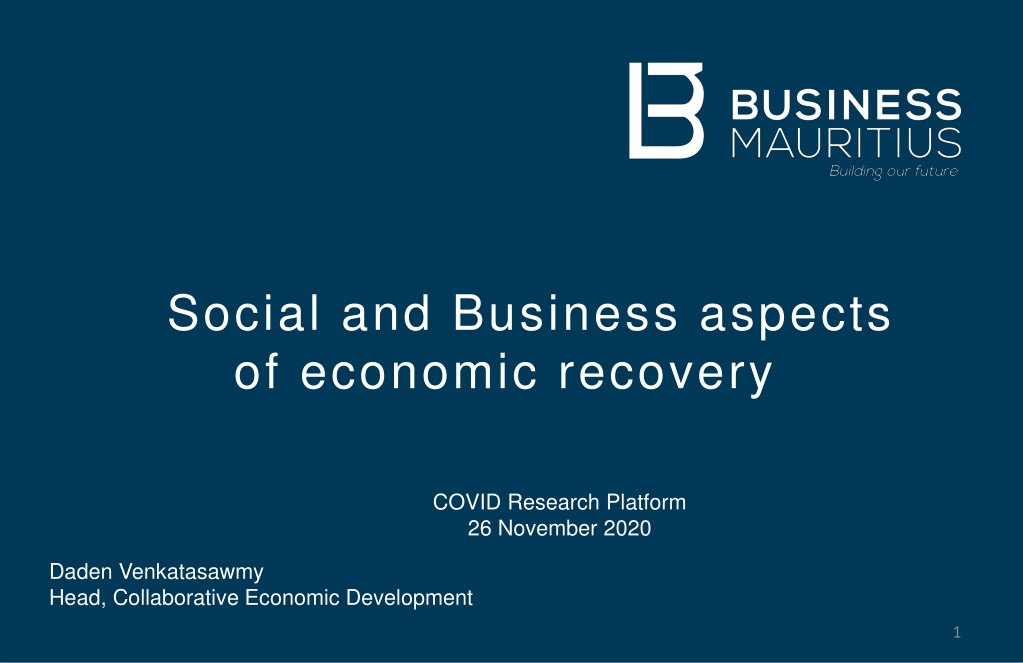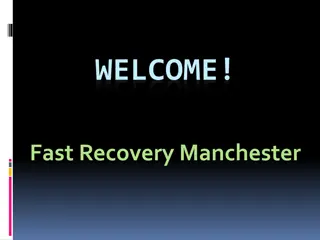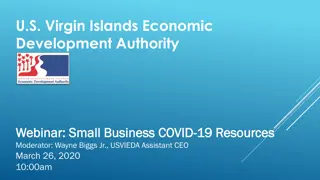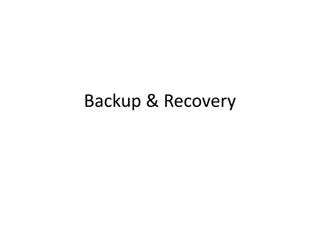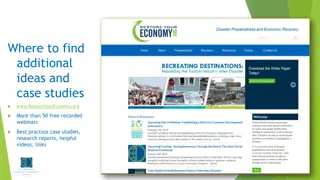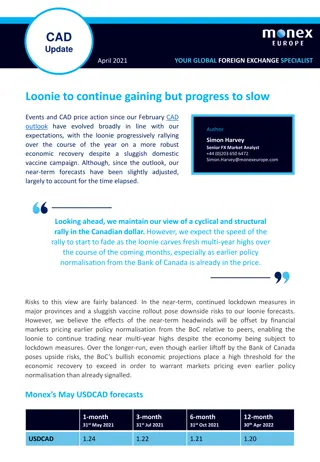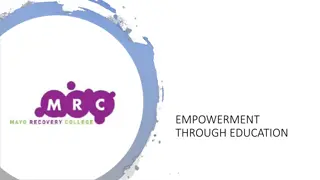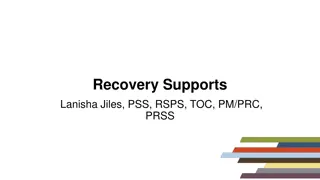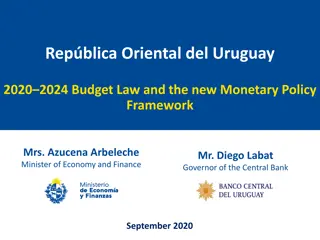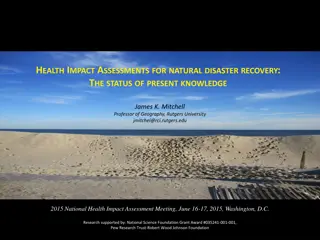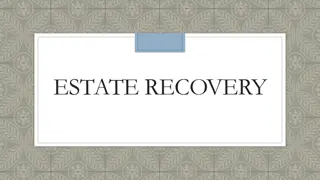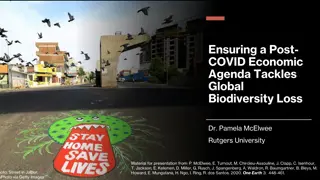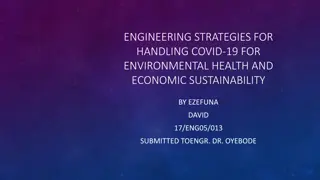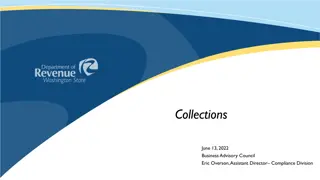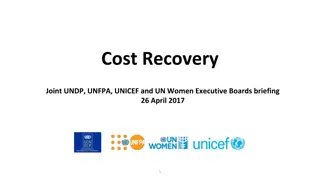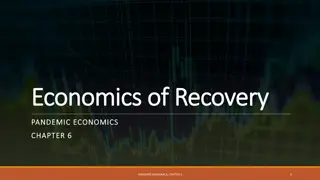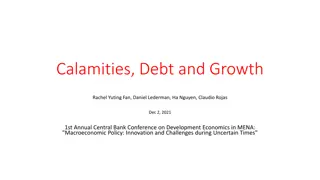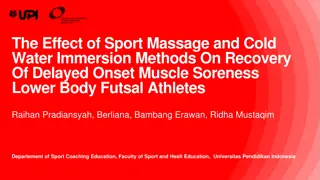Insights on Economic Recovery Amid COVID-19: Research Platform Findings
Research findings from a platform discussion on the social and business aspects of economic recovery post-COVID-19 in Mauritius. The study highlights survey results, methodology, and key findings on the impact of the pandemic on vulnerable households. Recommendations for sustainable recovery and future surveys are also outlined.
Download Presentation

Please find below an Image/Link to download the presentation.
The content on the website is provided AS IS for your information and personal use only. It may not be sold, licensed, or shared on other websites without obtaining consent from the author. Download presentation by click this link. If you encounter any issues during the download, it is possible that the publisher has removed the file from their server.
E N D
Presentation Transcript
Social and Business aspects of economic recovery COVID Research Platform 26 November 2020 Daden Venkatasawmy Head, Collaborative Economic Development 1
Agenda Highlights from the Rapid Survey by Comit Solidarit Highlights from the Business Survey Planned process for future surveys Views of Business Mauritius on how to recover in a sustainable way 2 BUSINESS MAURITIUS
Highlights from the Rapid Survey by Comit Solidarit (July 2020) Methodology Rapid Field Assessment to understand the impact of COVID on vulnerable families (Results to be released in December 2020). - Data collection focussed on the poverty pillars that are most impacted by Covid-19 - Employment / Income, Food and Health. - Secondary focus on the use of technology, psychosocial support, and registration on SRM. - Interviews by Field workers from 21 NGOs already working with vulnerable families - Field knowledge, Trust 3
Highlights from the Rapid Survey by Comit Solidarit (July 2020) Methodology Survey prepared and administered according to an established protocol with the assistance of Kantar TNS - Preparation of the questionnaire by the NGOs sitting on the Solidarity Committee - Pilot phase to test the questionnaire and the reformulate the questions - Group of 4 Team Leaders for project management - Training of interviewers by team leaders on the questionnaire, ethics, protocol and good practices to be adopted during data collection - Questionnaire administered face-to-face (54%) and by telephone (46%) - Data input on an online platform made available by Kantar TNS. 4
Highlights from the Rapid Survey by Comit Solidarit (July 2020) Process highlights - 21 NGOs mobilised - 2395 individuals interviewed in 215 locations over 25 days - Data allowed the formulation of clear recommendations to support vulnerable families - Report will be made public in December 2020 - Exercise will be repeated in January 2021 to adjust actions 5
Highlights from the Rapid Survey by Comit Solidarit (July 2020) Selected findings (Report not yet public) Access to government support 70% of respondents are not on the Social Register (SRM) 34% are eligible but are not on SRM Impact on Vulnerable Households as at July 2020 18% of Main Revenue Earners had lost their jobs 41% of households now have a reduced revenue 67% are not autonomous on food 56% are unable to apply for assistance online 82% feel stressed, more by financial issues than by COVID 80% say they need non-physical handholding/support (psychosocial) 6
Highlights from the Business Survey Survey to assess the impact of COVID-19 on Businesses Initiated by Business Mauritius in partnership with Statistics Mauritius, with the collaboration of MCCI, MEXA, AMM, AHRIM, MBA, IAM, MCA, BACECA and OTAM, with technical assistance from UNDP Mauritius. Target Members of Business associations and large Establishments from SM 2,707 companies contacted 404 Respondents (15% response rate, with good size and sector balance) Methodology Conducted by DCDM Research Web survey methodology with phone assistance UNDP Questionnaire customised/adapted by Business associations 7 BUSINESS MAURITIUS
Highlights from the Business Survey Objectives Assess the short-term, medium term and long-term impact of COVID-19 on business performance Assess the current and expected impact on employment Evaluate the short, medium- and long-term needs of businesses Analyse the innovative business models that firms have adopted or intend to adopt to build resilience Incorporate different dimensions such as gender, sustainability, and sectors in 1 to 4 above Identify practical policy recommendations to address vulnerability of firms and households in building resilience. 8 BUSINESS MAURITIUS
Highlights from the Business Survey Preliminary findings (Public launch early December 2020) (April-Sep 2020 v/s April-Sep 2019) 74% of the respondents reported a decline in sales 30% of companies experienced a decline of more than 50% 65% of exporting companies noted a fall in Exports 40% of exporting companies saw their exports decline by more than 30%. 43% of respondents have had cancelation or postponement of orders 35% of exporting companies are anticipating a drop in export by more than 20% over the next 6 months 33% companies are expecting a rise in their prices over the next few months 9 BUSINESS MAURITIUS
Selected findings from the Business Survey Preliminary findings (Public launch early December 2020) Majority of companies reported a decline in demand [61%] and 43% are expecting a decline over the next 3 months 34% companies report a decline in supply of raw materials or resell items 88% of companies did not release any full-time workers from employment (mainly thanks to the GWAS) 22% of companies have applied for Government financial supports (DBM, SME Equity fund, BOM, SIC and ISP excluding GWAS) 65% of companies who applied have received it Generally satisfied with the quality of service 82% companies benefited from GWAS 10 BUSINESS MAURITIUS
Planned process for future surveys Survey campaign to monitor evolution and fine-tune findings Repeat multisector survey in 6 months Run pulse surveys on specific issues Fewer questions and smaller targets Sector specific Issue specific More regular if monitoring critical 11 BUSINESS MAURITIUS
Impact of COVID 19 on the Mauritian Economy Percentage change in GDP Year 2019 2020 2021 Statistics Mauritius 3.0 -13.0 - MCB Focus 3.0 -14.3 7.5 IMF 3.0 -14.2 9.9 Source: Statistics Mauritius, MCB Focus, IMF WEO 12 BUSINESS MAURITIUS
Impact of COVID 19 on the Mauritian Economy Most hit countries in Africa (excluding Libya) -4 Angola -6.8 Cabo Verde -7 Republic of Congo -7 Morocco -7 Tunisia -8 South Africa -8.4 Sudan -9.6 Botswana -13.8 Seychelles -14.2 Mauritius -15 -10 -5 0 Source: IMF WEO October 2020 13 BUSINESS MAURITIUS
Recovering in a sustainable manner Key action areas Strategies to boost exports Resilience map of economic activities Changing employment landscape Business Continuity Planning, Adaptation and Innovation 14 BUSINESS MAURITIUS
Reopening of borders UN World Tourism Organisation Outlook 70% decrease in international inbound tourists (from Jan- Aug) Impact on earnings and jobs Mauritius in Top 10 most vulnerable destinations 15 BUSINESS MAURITIUS
Reopening of borders Contribution of Tourism 8.1% direct GDP contribution Direct employment of approximately 74,000 Indirect GDP contribution Catalytic effect 16 BUSINESS MAURITIUS
Reopening of borders Some perspectives for 2021, UNWTO (May 2020) A change in trend is expected in 2021 based on the assumptions of a gradual lifting of travel restrictions, the availability of a vaccine or treatment and a return of traveller confidence. The return to 2019 levels in terms of tourist arrivals would take between 2.5 to 4 years Maldives and Seychelles (8% of total arrivals in September 2020 compared to same period in 2019) 17 BUSINESS MAURITIUS
Reopening of borders Other sectors Services: Financial services GBC Shared services Healthcare Education Real Estate Business travels/technical experts/FDI Others 18 BUSINESS MAURITIUS
COVID-Free, COVID-Safe Wait for a vaccine or develop a safe approach with Protocols Granular data on cases Testing and tracing app Private healthcare providers for asymptomatic cases 19 BUSINESS MAURITIUS
Questions and Answers Thank You 20 BUSINESS MAURITIUS
